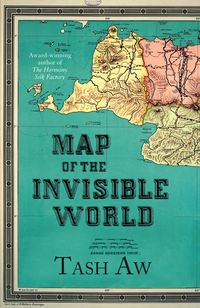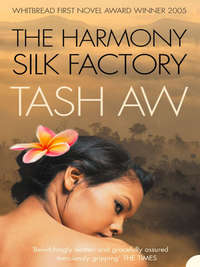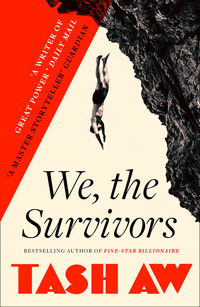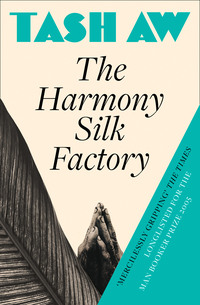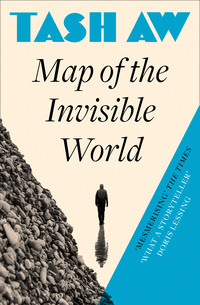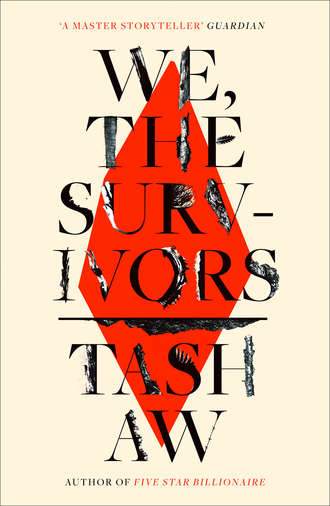
Полная версия
We, The Survivors
The other day at church I was sorting through the pile of books and magazines that people had donated – old paperbacks and textbooks dumped on a table in the hall where we have tea and cakes after mass. One of my little jobs at church is to arrange the books and empty the donations box. There’s rarely much money in it. Sometimes people might take a copy of Twilight, but they don’t put any money in. That day someone had left a whole stack of old Time magazines from 1979, 1980 – just a few years after I was born – and out of curiosity I took them home with me. I stayed up all night looking at the photos. The president of the United States was shot. Shot! Can you believe that? John Lennon got shot too. Hundreds of thousands of people on the streets in Cuba. Russians fighting in Afghanistan. The whole world was changing. Our own country must have been changing. And all I could think was: How did we stay the same? The people of the village – my grandparents, my parents, even the children – we must have been trying to protect ourselves against all of the things going on around us. That’s what our village meant to us: it existed to prevent us from knowing what was happening in the world. There can’t have been any other explanation.
But once the bridge was built, things were different. Not long after, the businessmen from down south started building small factories around Kuala Selangor to clean and process the fish and distribute it around the country. We caught mainly white pomfret and prawns – delicate produce that required careful attention. The factories worked faster than we could, and more hygienically too, they said. That was what all the big supermarkets in the cities wanted, those giant air-conditioned spaces that were just starting to be built, so we sold them our catches cheap and let the flimsy gutting shacks fall slowly into the sea.
It was better that way, the villagers said – now at least we can save time and catch more fish, and our kids can go to school instead of cleaning fish and repairing nets with the women. But still we didn’t go to school. We were supposed to, but no one really did. We turned up sometimes if we felt like it, we messed around, we cut classes, went out instead into the fields and plantations, smoked cigarettes, planned our escape from the village. Hong Kong, San Francisco – we imagined those places were just across the water, and that with a bit of cash in our pockets we could hop on a ship and start afresh there, just like our grandparents had when they’d come from Indonesia, or our ancestors who’d made it across from China a century before we were born. It seemed so easy.
But when I think back to that time, I realise that of course we didn’t seriously believe we were going to end up living in America. It was just a vague idea – a longing to be some place better than where we found ourselves. Those kinds of ambitions belonged to people like you, not people like us. You know what I mean – people who lived in the cities, who went to decent schools. We were just village kids, messing around. One or two of the kids, the serious ones at school who worked hard and passed all their exams, they would only end up in a college nearby in Klang, or train to be a teacher. Keong and I and the rest of the children from the village, we didn’t want that life. We wanted to be tycoons. But the funny thing was, we also knew we weren’t going to become tycoons. How to explain this? The more we longed for something, the more impossible it became. You only dream about things you can never obtain.
We heard about people from nearby villages moving to KL or Singapore, or going abroad to Australia or the US, and when they came back they were rich. We were eight, ten, twelve years old – we didn’t even know what that meant, didn’t know how they got rich or what they did for it, or even how much money you needed to be considered rich. All we knew was that they had left their homes, and now they had more than us. Sometimes they’d come back for Chinese New Year or Cheng Beng and I wouldn’t even recognise them, these men and women who’d been part of my childhood. They had big new Japanese cars, Honda Accords, that sort of thing, and all the smaller kids would climb into them. I remember crawling over the seats, rubbing my face on the upholstery and sniffing the newness of it, while another kid pretended to drive the car even though he couldn’t even see over the steering wheel. The very presence of such a vehicle in the village made everything else look shabby and poor. The smooth curves of the silvery body were beautiful and effortless and powerful – like a shark cutting through the water. All around it, our houses looked tired. Fragile. Concrete blocks and timber, patched up with zinc sheeting and planks of wood, every element a different colour and texture. If a storm blew through the village at that precise moment, everything else would have been swept away and only the car would have been left standing.
As I grew older and started to learn about the world, I could have asked them what they did in life, what kind of jobs they worked at, how they managed to leave the village and all that, but I never approached them. From a distance I watched them unload presents from the boot, carrying the boxes slowly into their family homes so that the rest of the village could see what they were – a colour TV, a Japanese rice cooker, a hair dryer. It wasn’t just their clothes that had changed, but their voices too – not much, just a bit louder and clearer than before, with more English and Mandarin thrown into our dialect. Enough to make me feel that I couldn’t communicate with them any more. Or maybe I wasn’t that interested. I didn’t have to go away and do what they did. I had a belief that life would improve for me, even if I didn’t know how.
I wasn’t the only one who was optimistic. Around this time, when the new roads and factories were starting to be built, as well as the first of the new suburbs further down south with their shopping malls and car parks, everyone in the village was happy that we didn’t have to gut and clean all that fish any more. We were delighted that someone else took our catch from us and cleaned it in a processing plant. Simply hearing that expression made us feel that we were becoming more sophisticated. We knew that we were selling the fish more cheaply than we had before, but it didn’t matter. Now we could spend more time at sea. Now we could start farming cockles in the mudflats that stretched out for hundreds of yards right from our front doors. Auntie Hong found a new recipe for prawn crackers that became so famous that day-trippers came up from the city at weekends to buy them, and one day an article appeared in the national newspapers under the title ‘Forgotten Seaside Charms’. I can still remember the photo of her, dressed up nicely in a red blouse, with matching lipstick and blue eyeshadow that made her look like a completely different person – who even knew that she had make-up? But there she was, proudly holding a bag of crackers in one hand, and a raw prawn in the palm of the other.
For about ten years, right up until I left the village, we got used to the excitement of the harvests of cockles – the distant sound of the shells as they were emptied from the boats into huge blue plastic tubs for cleaning. A bright sharp drumming noise that you could hear from hundreds of yards away. It was easier than going out to sea for long stretches, men and women could work together, they didn’t have to be separated from their families for so long, could see the storms coming and take refuge. The children helped sort through the harvest. We picked out all the empty shells or those already half-open and dead. By the time I left the village, I knew that I would be one of the last of the children to be doing that job. Each year the harvests grew smaller, and we started to find more plastic bags in the mud that got dredged up with the catch, wrapping around the shells and suffocating them. One year I found dozens of condoms too. Maybe a factory had dumped them there, or they were carried downstream in the river – who knows. The younger kids had no idea what they were – they blew them up as though they were balloons, wore them on their fingers and clawed the air pretending to be a Pontianak or some other evil ghost. We laughed a lot that year.
Then some of the kids started getting a rash on their hands – red and tender, like the raw flaking patches that follow a burn, except more itchy than painful. I was the only one who guessed that it was from the mud – some of the villagers had the same problem on their feet, from wading in the shallows during the harvest. People started visiting the Monkey God temple to make offerings and prayers. We burnt paper-money – we thought it was our fault, that we hadn’t done enough to appease the heavens. Everyone said, If we were richer, we could make more donations to the temple, we’d have better catches. They didn’t realise that there was nothing they could do about all the pollution flushing down the river that went right through the cities and emptied into the sea in front of our houses. Or from the offshore prawn farms that had started further up the coast where the water was deeper – you could smell the chemicals sometimes, late in the afternoon when the wind was blowing in the right direction. A sour stink, like old catpiss. Even though I wasn’t good at school, I understood that all those big industries further inland which were making cars and air-conditioners and washing machines and American sneakers – they lay close to the same river that washed over our cockle beds, forty, fifty miles away, and they would just carry on emptying their waste into the river, more and more as the years went by. I didn’t even feel sad, or angry – why get mad over something you can’t change? That was just the way things were.
The only thing that infuriated me was that no one wanted to listen to me when I told them what I thought was happening. Pollution? My grandmother repeated the word as if it was some bizarre other-worldly phenomenon, like an interplanetary collision in another solar system. She turned her back on me and went to the temple. ‘Don’t know what they teach you in school these days.’
Whenever anyone came back from the temple, they’d talk about destiny. To live like this is our destiny. I never thought about the meaning of fate and chance until I was in prison, and ideas just came to me during those long hours when I was lying on my bed doing nothing. What would have happened if my grandparents had landed further up the coast, or drifted south? If the winds or tides had been stronger or weaker and had carried them to Perak or Johor, or to Port Klang itself? Would I have been a dock worker or a sailor, or maybe a ship’s captain? That would have been fun. If they’d landed somewhere else on the coast, where they weren’t trapped between river and sea, maybe they’d have travelled inland and gone straight to a city. Maybe then, I would have become you.
I’m just kidding. Of course I couldn’t have become you. I know it’s not that simple. And I don’t mean that I want to become you, or someone like you. It’s just that sometimes I can’t help thinking about whether I was really destined to be me.
October 10th
The dispute was about money, as it always is. That’s why the man died. It wasn’t because of a woman, as some of the papers suggested. People like us don’t fight over love, we fight over houses, land, sometimes cars, mostly money – things that make a difference to the way we live.
About five, six weeks before the night in question, I got a call at work. Hendro, one of the Indonesians who’d been working for us for some time, came running up to the edge of the water, shouting, Boss, boss, telephone. His head was wrapped in his usual blue-and-white bandana, his hands blackened with grease as he signalled for me to go to the office. From a distance, he looked like a superhero cartoon toy, stout and smiling, even though he’d been working since daybreak, tarring the dirt yard in front of the small office building with a few of the other guys, transforming it into a proper car park with a tarmac surface so the cars and scooters wouldn’t churn up the mud in the rainy season. We were getting more and more visitors then, people coming up from KL and as far as Alor Setar to inspect the farm and witness for themselves the quality of our produce, our new filtration systems, the freshness of the water, the hygiene levels. They needed to be sure of these things before they signed supply contracts with us, so we had to impress them. We couldn’t have their cars sinking into the red mud or arriving back in town looking as if they’d driven to the Sahara and back. My boss had money then, business was good.
I started to make my way across the walkways, back towards the shore. I’d been supervising the release of the newest batch of hatchlings. Sea bass, that’s what we were concentrating on that year, we knew the price of it would be high. There’d always been demand from Chinese restaurants, but then the upscale Western places started serving it too. A couple of our customers, who ran a neighbourhood restaurant somewhere in Petaling Jaya, showed us their menu – our fish might be selling at the same price as fancy imported produce like salmon and cod. ‘You kidding me?’ I said. ‘Local people really paying these kinds of prices for sea bass – you sure it’s not Westerners?’ They assured my boss it was easy. Their clients preferred fresh local produce, they didn’t want stuff that was frozen and flown all the way from Australia or Alaska. Their restaurant was just a café, it didn’t look anything special, but it was selling sea bass fillets at fifty, sixty ringgit a serving. I thought of that money as I watched the tiny fish swim slowly out of the plastic bags, shimmering against the dark water like a bright silver cloud. A hundred bucks each on someone’s plate in the city.
I couldn’t stop thinking about the value of those fragile little fish as I walked along the wooden planks lashed to the floating oil drums. The farm had grown in recent times, and each year we added another few pens to the existing ones – floating cages framed by timber squares on the surface that served as walkways, the nets suspended in the water below. That year, the twelfth of the farm’s existence, we had grown to twenty enclosures, five of them added in the last few months alone. I liked the neatness of the grid, knew my way around it, was quick on my feet, never losing my balance even if I had to run along the narrow decks in bad weather, when the water was choppy and the wind was up. I’d stand and look down at the fish thrashing at the surface of the water as the men threw in the feed, feeling the platform bob gently under my feet as the fish disturbed the water. And I’d be happy that I no longer had to jump in to repair the netting or retrieve plastic bags and bottles and other debris that got blown in by the storms. I’d grown up by the sea, but it remained unpredictable to me, always capable of change and destruction.
It took me a while to get back to the jetty, and I thought that the caller would have hung up by then. People get fed up of waiting, especially young people – everyone is in a hurry all the time. Hendro walked to the office with me, complaining about all the work they had to do. It was just him and two other Indonesians resurfacing the car park – Budi and Joyo, who were newer, who didn’t know how to operate the machinery. They were slow, he had to show them how to do everything. Hendro had to deal with one of the generators too, which had blown up the previous night and needed to be fixed by the end of the day. A cage had been ripped and needed to be mended. One of the jetties had to be repaired. Then there was the maintenance of the pens, checking the water filters, doing the feeding rounds – he was having to do it all. They stupid, boss, they stupid. I laughed. When I started out here at the farm, I did all that work myself. And I never complained, I just did what needed to be done. ‘Aiya, people these days,’ I told him, ‘they just like to complain about everything. Damn migrant worker also complain, how can?’ We laughed. ‘Get the tarmac done first, the other jobs can wait until later.’
He knew that if he did everything well and didn’t cause any trouble, with all the new work we were getting, I’d make sure Mr Lai gave him some extra cash at the end of the month to send back to his wife and daughter in Java – nothing much, fifty, a hundred ringgit maybe, two hundred at Hari Raya. Sometimes, if I felt that he’d done a lot of work that month, or if we’d had a particularly difficult time with the weather or supplies, and the boss only gave him a small tip, I’d give him some extra cash from my own pocket. He’d been with us for four years, and I thought he deserved something good – it was unusual for a worker to stay that long.
The boss didn’t notice all that – the physical work we did on the farm, or the men who did it. He’d started spending more and more time on the road, searching for bigger clients farther afield – his latest obsession back then was the big supermarket chains in the Klang Valley, Tesco and Carrefour and suchlike. Some weeks he didn’t even show up at the farm one single day. Most days it was just me keeping an eye on the place, supervising twelve workers. It was always difficult to find good Indonesians, men who’d stick at the job and didn’t steal or cheat or gamble their earnings away – that was what the boss always said, and I think that’s why he could never remember their names. He didn’t want to know about their lives, didn’t want to think of them as real people – it was easier that way when one of them suddenly didn’t turn up for work. You lose a man like that, of course you wonder what’s happened to him. Maybe he’d been hit by a bus in the night while coming back from one of the brothels down near the port, or he’d died in a fight or got picked up by the police, or just decided enough was enough and headed back to Kalimantan without bothering to collect his wages.
Stay in the business long enough, you hear all kinds of stories about what happens to these foreign workers. Just that week, three workers from the sheet metal factory down the road went missing and were found two days later, in a shack on the edge of a plantation, their eyes bulging and bloody, their mouths gone – no more lips or tongue, just a mess of bone and blood, dissolved by acid. That’s what happens with paraquat poisoning, it burns a hole in your throat – this bit here [touches throat, makes gurgling noise] – and all the blood and whatnot comes bubbling up. One of them was a woman, a girl really, not even twenty-five years old. Who knows why they decided to commit suicide together. Workers kill themselves all the time here, and I can’t say I’m surprised. I know it’s wrong, it’s a sin. Everyone knows that. When I started going to church that was one of the first things people told me – I guess they were concerned about my mental state, afraid I might try something stupid once I started to repent and realised what I had done, as if I hadn’t realised before. God will punish you if you commit suicide! Churchgoers told me that all the time. But sometimes, when you see the way these Indons and Bangladeshis live, it makes sense. [Pause.] What I mean is, if there’s no ceremony or leisure in your life, why would there be in death? If I worked eighteen hours a day and only had two rest days a month, and hadn’t seen my family for seven years, I wouldn’t be thinking of a luxury funeral with all my friends and huge bouquets of flowers and black cars the way you sometimes see in town, when some big boss dies. I wouldn’t be thinking about whether my family will take out a full-page ad in the papers to announce my passing, like those Chinese tycoons do. I wouldn’t be thinking about a portrait of myself dressed in a suit and tie. I’d think: it’s time to go. And I’d go. No messing about.
The boss wasn’t interested in all that. As long as the farm kept running well, and no one stole any money or machinery, he didn’t care who worked there, how long they stayed, whether they were happy. Ah Hock, that’s why I have you! He used to joke that I was half-foreign – that maybe my dad had been with a prostitute, and that’s why I got along with the workers so well, because I had Indon blood in me. ‘Don’t know how, but you actually understand these guys,’ he used to say. Sometimes, when clients came to visit and remarked on how smoothly things ran, the boss would tell them that it was down to me. ‘My foreman does everything, makes sure the boys work well – village boy, easier for him to communicate with them, hor.’
I was proud that he boasted about me like that. Although I grumbled from time to time about his absences, it secretly felt good to be trusted like that. I’d been working on the farm for nearly ten years, and I’d got to that point in time when one year began to resemble the next, changing in ways I could anticipate, in ways that I wished for. My salary was going up only slightly, but it was increasing all the same. I’d got used to small surprises – a nice angpow at Chinese New Year from clients or machinery suppliers, sometimes a present when the boss came back from holiday, like that box of special Hokkaido wafers when he went to Japan one time.
When life evolves like that, one small gift coming on top of another, you start to feel strong. Your salary, which surprises you at the beginning – because its regularity is astonishing, because it keeps coming to you even when you think it might stop abruptly at any moment – starts to feel as if it has always been there. An unshakeable part of the universe, like atoms or the cells in your body. You receive it month after month, one year, two years, four, eight – it can never end. You start to feel complacent, though it doesn’t strike you as complacency, but a sensation of solidity that surrounds you, so thick that sometimes you wake up in the night and believe that you can reach out and touch it.
Put it another way: I was thankful. I’d left home a few years before that – moved away from the village and drifted through a number of jobs in KL before returning to the area. I worked in a hardware store in Klang for a couple of months, then a shop that sold small agricultural tools and equipment just opposite the train station. I was loading some bags of fertiliser onto a customer’s truck one day when I saw he had a big watch, a Rolex. This was the kind of thing that my time in KL had taught me to notice – shiny, expensive objects worn by their owners as a sort of challenge. Look at me, resist me. Covet me, reject me. I kept loading the bags, flipping each one up onto my shoulder and carrying it from the shop to the truck, fifty pounds a time, and all I could see out of the corner of my eye was the watch on the man’s wrist as he stood there, hands on his hips. He checked the time. It was noon. It was hot.
When I finished he reached into his pocket and I thought he was going to give me a tip, maybe two–three ringgit, something like that, but instead he gave me his business card. ‘Ever need a job, just ring me,’ he said. He was called Mr Lai, and he owned a few vegetable farms near Sekinchan, some orchards, a goat farm. Plus, he was the middleman, the one who employed the groups of migrant workers to harvest the rice for the Malays who owned the biggest ricefields in the area. He arranged everything for them, got the groups of Bangladeshis and Indonesians in for the season, paid them their wages in cash, then sold the rice for the land-owners. Of course he took a cut from everything – not much, a bit here, a bit there, enough to end up a wealthy man. People make job offers all the time, but when you call them, the work isn’t there any more. I’d got used to that way of living. A promise isn’t a promise. Still, I kept the card.
A few months later, when I had a problem with my employers – they accused me of stealing, which wasn’t true, not at that job, anyway – I just turned around and walked out. The boss-lady was sitting at the desk, the cash register open, scolding me, her voice as harsh as a drill into concrete. You want the money for what, buy drugs is it? Owe money to a loan shark? What? Her husband stood behind her, his arms folded across the top of his paunch. Above them the clock showed nine o’clock. I could feel the sentences forming in my head, explaining that it was a mistake, that if they looked at the books again, the numbers would add up, that I wasn’t the only one in charge of receiving the money. Or maybe I’d made a mistake, hadn’t counted the notes properly when a big payment came in – who knows? But she was shouting too loudly, one question layered on top of another, and I couldn’t keep up, the sentences in my brain never stitched together to form a clear line of defence. I wanted to scream all kinds of swear words, smash the glass cabinet in front of me with my bare fists, kick down the shelves of paint and screws and weighing scales, see all that cheap shit fall to the ground. But instead I grinned. I didn’t even know I was pulling a silly cheerful face until the boss-lady said, ‘Smile what? Crazy boy. Where you going? Come back! Why you smiling?’


